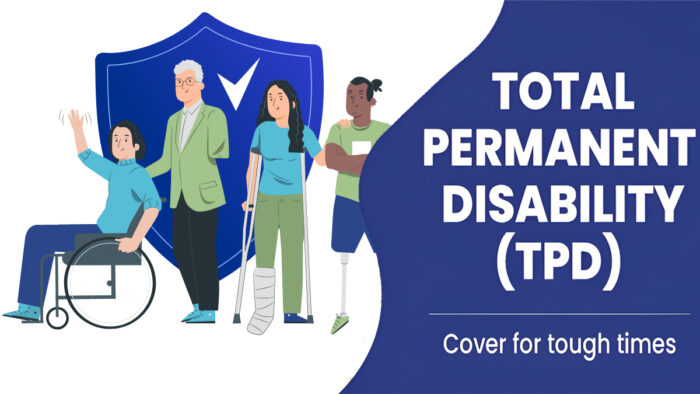Total and permanent disability insurance, also known as TPD insurance, is a special form of insurance that offers coverage to policyholders who are immobilized and out of action as a result of an illness, injury, or serious disability.

This specialized type of insurance is very important, as it makes sure that policyholders and their families get the financial stability and support they need during the recovery period of this unexpected life change.
In other words, if you are not able to continue your career because of a serious illness, you can get financial coverage with a total and permanent disability insurance policy.
How Does It Work?
TPD insurance usually becomes active when the policyholder is medically declared permanently and totally disabled. Although the criteria for this diagnosis can differ by quote, generally, the impairment or condition must stop the person from working in their previous work career and capacity.
Hence, if you meet the policy’s criteria, you will receive a lump sum payment provided to reduce the financial difficulties of not being able to work or earn money.
What Does Total and Permanent Disability Insurance Cover?
If you have a standard TPD insurance quote, these are the scenarios you will be receiving coverage for:
- Medical expenses.
- Rehabilitation costs.
- Home modification costs.
- Loss of income.
- Debt repayments.
What Does It Not Cover?
There are various exclusions that are not usually covered by total and permanent disability insurance policies. They include:
- Criminal acts.
- Pre-existing conditions.
- War-related injuries.
- Self-inflicted injuries.
The coverage and exclusions of a TPD insurance quote are usually determined by the insurance company or provider.
How Much Does Total and Permanent Disability Insurance Cost?
The price of purchasing a total and permanent disability insurance policy is determined by various factors. The coverage level, policyholder’s age, insurance provider, occupation, and health are elements that determine the cost of a TPD insurance quote. In most cases, older age groups and high-risk jobs get higher premiums.
Who Needs a Policy?
Before considering a TPD insurance policy, it is important to find out if it is the right quote for you. With that being said, here are the individuals that need this form of coverage:
- People with high-risk jobs.
- Primary income earners.
- People with mortgages and debts.
- Self-employed experts.
- People without enough savings.
- Individuals with dependents.
If you fall into these categories, then you should purchase a TPD insurance quote to get coverage when you need it.
How to Get Total and Permanent Disability Insurance
This is a process that involves different steps, and you need to follow them carefully and consider the necessary steps to successfully obtain a policy that offers the right amount of coverage. With this in mind, here are the steps you need to take to get a TPD insurance quote:
- Assess your needs.
- Research insurance companies.
- Check the eligibility requirements.
- Understand the terms of the policy.
- Gather policies.
- Consider seeking help from a financial advisor.
- Apply to get coverage.
- Be honest in your application.
- Review your policy details.
- Keep your documents safe.
With these steps, you can get TPD insurance that will give you and your family peace of mind and stability while you are recovering.
FAQs
What is the difference between TPD insurance and regular health insurance?
The difference between TPD insurance and regular health insurance is that TPD offers a lump-sum payment to policyholders who have been medically declared disabled. Health insurance, on the other hand, covers the medical costs of health issues.
Can I get TPD insurance if I already have a disability?
Yes, purchasing a total and permanent disability insurance policy is possible after a disability. However, existing disabilities might not be covered by the policy.
Does TPD insurance cover temporary disabilities?
No, total and permanent disability insurance does not offer temporary disabilities but only covers permanent disabilities.
What happens if I recover from a disability after receiving a payout?
Normally, you are not required to pay back the payout of an insurance policy if you have recovered after being disabled.



